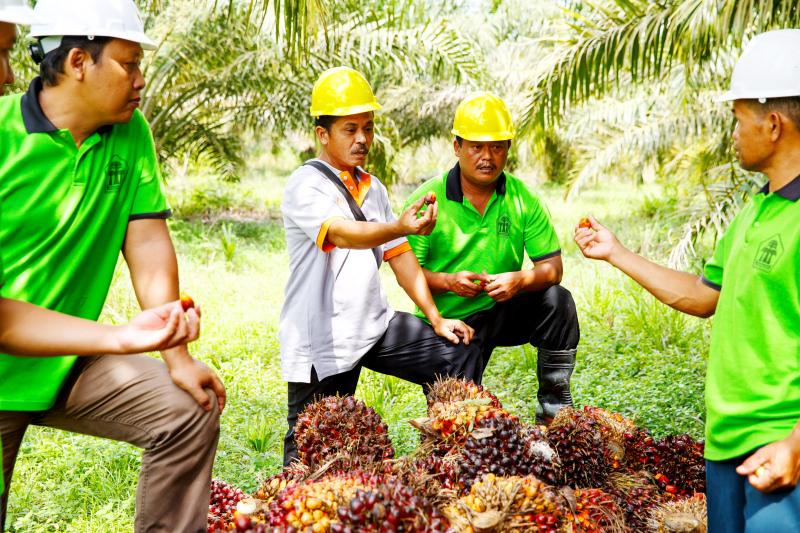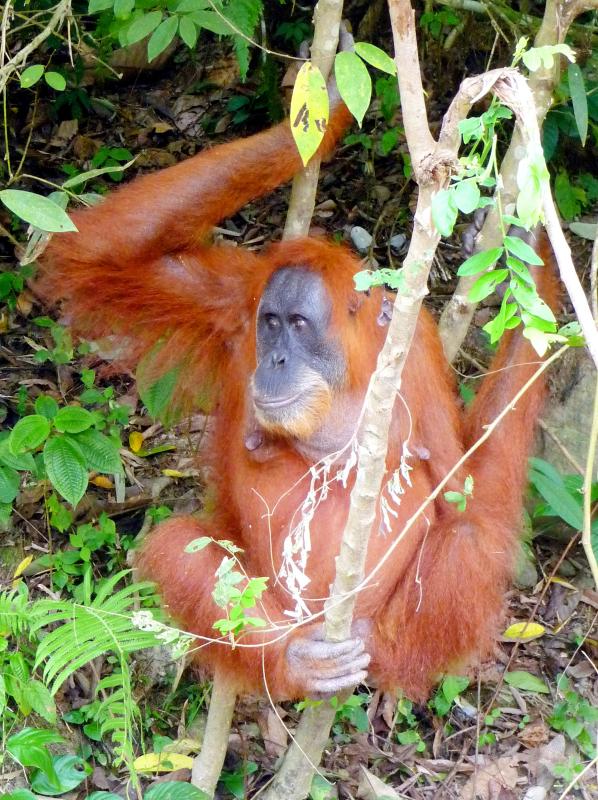The farming of African oil palms, which has transformed vast areas of Malaysia and Indonesia, is one of the world’s most controversial types of agriculture.
Demand for palm oil — a common ingredient in processed foods and personal care products — drives deforestation and the destruction of tropical peatlands. To make space for oil-palm plantations, tracts of forest are cleared, sometimes by bulldozer, but often by burning. Forest fires release huge amounts of carbon dioxide, the principal greenhouse gas, as well as soot.
In Sumatra and Borneo, orangutans, rhinos, elephants and tigers are losing their habitats to the African oil palm, as are clouded leopards, pangolins, macaques and tapirs. Several of these species are vulnerable; some are critically endangered.

Photo courtesy of the Roundtable on Sustainable Palm Oil
In Europe in particular, photos of orphaned orangutans upset consumers. Fearing boycotts, retailers have sought alternatives to palm oil, or to source the commodity from growers certified by the Roundtable on Sustainable Palm Oil (RSPO). This Kuala Lumpur-based NGO develops and implements global standards for the environmentally and ethically-sound production of palm oil.
The industry-dominated RSPO is not without its problems. It has been accused of greenwashing and, as recently as last month, of certifying palm oil produced on plantations guilty of serious labor abuses.
Switching from palm to other oils could be even worse for the environment. Joe Fassler, in the March 2016 issue of Smithsonian Magazine, points out that: “No other crop can yield even a third as much oil per acre planted. And along with using less land, the oil palm gobbles up significantly fewer pesticides and chemical fertilizers than coconut, corn or any other vegetable oil source.”

Photo: Steven Crook
At the end of 2018, British supermarket chain Iceland ceased manufacturing products which contain palm oil. By May 2019, UK department-store chain Selfridges had eliminated palm oil from its own-label range. British online retailer Ocado lists more than 2,100 palm oil-free items on its Web site.
CONSUMER PRESSURE LACKING
According to Carrefour’s global Web site, since 2015, 100 percent of the palm oil used in its own-brand products has come from RSPO-certified suppliers.
Carrefour, which has 131 stores in Taiwan, began working with RSPO in 2006. The French multinational’s palm oil procurement policy now includes RSPO standards “and additional requirements to do with protecting forests and peat bogs.”
In 2019, 86 percent of the palm oil shipped to Europe met RSPO standards. RSPO says it can’t provide a figure for Taiwan, but the behavior of local manufacturers and retailers — even those doing the right thing — suggests that local consumers’ priorities do not include saving the orangutan.
Sifting through Carrefour’s Taiwan Web site turns up very few mentions of sustainable palm oil. The frozen scallion pies and pancakes supplied by Taipei-based Laurel Corp are made using “green and sustainable internationally certified palm oil,” but that’s about all.
Searching for palm-oil free products brings up just three items. Two are car-care products; the third is a nut-flavored spread imported from France. Surely other items on Carrefour’s shelves in Taiwan include sustainable palm oil, or no palm oil whatsoever, but it seems there’s no incentive to highlight this characteristic.
The Environmental Impacts section of Costco’s global Web site says the company is committed to ensuring that all palm oil and other palm-based derivatives and fractions in its Kirkland Signature products “will be 100-percent RSPO certified (or equivalent) by 2021 or sooner.” This policy applies to the local sourcing team in Taiwan as well as to non-Kirkland Signature products made elsewhere. However, Costco’s Taiwan Web site currently doesn’t acknowledge this undertaking.
The Web site of RT-Mart, which operates 22 stores around Taiwan, makes no mention of sustainable palm oil. Nor does that of PX-Mart, a chain of 1,015 supermarkets.
By contrast, the English and Chinese versions of Hsin Tung Yang’s 2019 Corporate Social Responsibility Report highlight the company’s decision to begin using sustainable palm-oil products. In 2019, 14.3 percent of the palm oil purchased by Hsin Tung Yang — known for the meat jerkies and pineapple cakes it sells at Taiwan’s airports — was RSPO certified.
The number of Taiwanese companies holding RSPO membership grew in 2020 to 42, but Hsin Tung Yang and Laurel Corp aren’t among them.
Units of some high-profile conglomerates, including Uni-President Enterprises Corp and Want Want Holdings Ltd, have signed up to RSPO. Certain household names like I-Mei Foods Co (palm oil is an ingredient in its ice cream) and Kuai Kuai Co (whose signature snack includes palm oil) aren’t in the grouping.
Joining RSPO doesn’t necessarily mean a wholehearted embrace of the organization’s principles. As an e-mail from Chi Mei Frozen Food Co — an associate member since mid-2018, and the only local food producer willing to discuss the issue of palm oil with this reporter — concedes, if it weren’t for supply-chain pressure from outside Taiwan, there’d be even less progress on this issue.
“So far, we only use sustainable palm oil in one product [a type of frozen guabao bun], that is exported to Europe because our customer requires it. And we don’t use much of the oil since COVID-19 has hit the economy badly all over the world,” says a member of the company’s marketing and planning department.
GLOBAL PROBLEM
Taiwan isn’t the only place where food companies and soap manufacturers aren’t eager to source the palm oil they use from responsible growers.
China imported 8.49 million tonnes of palm oil in 2019, according to China Dialogue, an NGO that investigates the country’s environmental challenges. Less than 2 percent of it was RSPO-certified.
In Taiwan, several Chinese-language media have reported the consequences of the palm-oil industry’s rapid expansion. Local NGOs like the Environmental Information Center (環境資訊中心, e-info.org.tw) are trying to educate the public.
In recent years, palm oil has sold for between US$600 and US$750 per tonne, with a tonne of sustainable palm oil costing around US$30 more. This premium doesn’t make much difference to the cost of items on supermarket shelves, because palm oil is a minor ingredient in most finished products.
Ten years ago, CommonWealth magazine reported that in a nine-country survey of green consumerism, 24 percent of respondents were willing to pay more for eco-friendly goods, while according to the magazine’s own survey, 80 percent of Taiwanese respondents were amenable to paying a green premium.
Kantar’s Purpose in Asia report on consumer concerns, published in late 2018, found that Taiwanese were the only group (of nine Asia-Pacific nationalities surveyed) to put “climate action” among their top three concerns. Air pollution afflicting Taiwan was the top environmental issue.
Could it be that local consumers are still unaware of the ubiquity of palm oil in everyday products? Or that they say one thing, but do another when it comes to spending their own money? Or, perhaps, their interest in environmental issues doesn’t extend beyond the country’s borders? For the sake of Southeast Asia’s forests, it’s time local consumers began putting pressure on supermarkets and the companies they buy from.
Steven Crook, the author or co-author of four books about Taiwan, has been following environmental issues since he arrived in the country in 1991. He drives a hybrid and carries his own chopsticks.

A vaccine to fight dementia? It turns out there may already be one — shots that prevent painful shingles also appear to protect aging brains. A new study found shingles vaccination cut older adults’ risk of developing dementia over the next seven years by 20 percent. The research, published Wednesday in the journal Nature, is part of growing understanding about how many factors influence brain health as we age — and what we can do about it. “It’s a very robust finding,” said lead researcher Pascal Geldsetzer of Stanford University. And “women seem to benefit more,” important as they’re at higher risk of

March 31 to April 6 On May 13, 1950, National Taiwan University Hospital otolaryngologist Su You-peng (蘇友鵬) was summoned to the director’s office. He thought someone had complained about him practicing the violin at night, but when he entered the room, he knew something was terribly wrong. He saw several burly men who appeared to be government secret agents, and three other resident doctors: internist Hsu Chiang (許強), dermatologist Hu Pao-chen (胡寶珍) and ophthalmologist Hu Hsin-lin (胡鑫麟). They were handcuffed, herded onto two jeeps and taken to the Secrecy Bureau (保密局) for questioning. Su was still in his doctor’s robes at

Last week the Democratic Progressive Party (DPP) said that the budget cuts voted for by the China-aligned parties in the legislature, are intended to force the DPP to hike electricity rates. The public would then blame it for the rate hike. It’s fairly clear that the first part of that is correct. Slashing the budget of state-run Taiwan Power Co (Taipower, 台電) is a move intended to cause discontent with the DPP when electricity rates go up. Taipower’s debt, NT$422.9 billion (US$12.78 billion), is one of the numerous permanent crises created by the nation’s construction-industrial state and the developmentalist mentality it

Experts say that the devastating earthquake in Myanmar on Friday was likely the strongest to hit the country in decades, with disaster modeling suggesting thousands could be dead. Automatic assessments from the US Geological Survey (USGS) said the shallow 7.7-magnitude quake northwest of the central Myanmar city of Sagaing triggered a red alert for shaking-related fatalities and economic losses. “High casualties and extensive damage are probable and the disaster is likely widespread,” it said, locating the epicentre near the central Myanmar city of Mandalay, home to more than a million people. Myanmar’s ruling junta said on Saturday morning that the number killed had